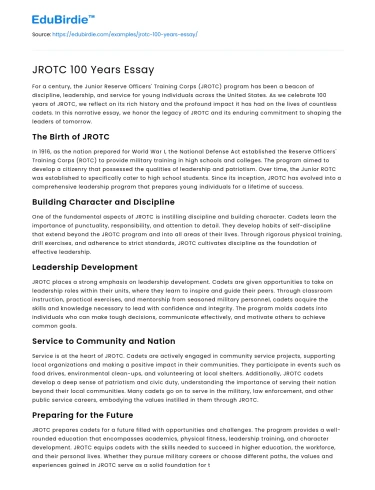For a century, the Junior Reserve Officers' Training Corps (JROTC) program has been a beacon of discipline, leadership, and service for young individuals across the United States. As we celebrate 100 years of JROTC, we reflect on its rich history and the profound impact it has had on the lives of countless cadets. In this narrative essay, we honor the legacy of JROTC and its enduring commitment to shaping the leaders of tomorrow.
The Birth of JROTC
In 1916, as the nation prepared for World War I, the National Defense Act established the Reserve Officers' Training Corps (ROTC) to provide military training in high schools and colleges. The program aimed to develop a citizenry that possessed the qualities of leadership and patriotism. Over time, the Junior ROTC was established to specifically cater to high school students. Since its inception, JROTC has evolved into a comprehensive leadership program that prepares young individuals for a lifetime of success.
Building Character and Discipline
One of the fundamental aspects of JROTC is instilling discipline and building character. Cadets learn the importance of punctuality, responsibility, and attention to detail. They develop habits of self-discipline that extend beyond the JROTC program and into all areas of their lives. Through rigorous physical training, drill exercises, and adherence to strict standards, JROTC cultivates discipline as the foundation of effective leadership.
Leadership Development
JROTC places a strong emphasis on leadership development. Cadets are given opportunities to take on leadership roles within their units, where they learn to inspire and guide their peers. Through classroom instruction, practical exercises, and mentorship from seasoned military personnel, cadets acquire the skills and knowledge necessary to lead with confidence and integrity. The program molds cadets into individuals who can make tough decisions, communicate effectively, and motivate others to achieve common goals.
Service to Community and Nation
Service is at the heart of JROTC. Cadets are actively engaged in community service projects, supporting local organizations and making a positive impact in their communities. They participate in events such as food drives, environmental clean-ups, and volunteering at local shelters. Additionally, JROTC cadets develop a deep sense of patriotism and civic duty, understanding the importance of serving their nation beyond their local communities. Many cadets go on to serve in the military, law enforcement, and other public service careers, embodying the values instilled in them through JROTC.
Preparing for the Future
JROTC prepares cadets for a future filled with opportunities and challenges. The program provides a well-rounded education that encompasses academics, physical fitness, leadership training, and character development. JROTC equips cadets with the skills needed to succeed in higher education, the workforce, and their personal lives. Whether they pursue military careers or choose different paths, the values and experiences gained in JROTC serve as a solid foundation for their future endeavors.
Impact on Cadets' Lives
Throughout its 100-year history, JROTC has left an indelible mark on the lives of its cadets. Many alumni credit the program with shaping their character, instilling discipline, and setting them on a path to success. JROTC fosters a sense of camaraderie, belonging, and purpose among its participants. It provides them with lifelong friendships, mentorship, and invaluable experiences that shape their outlook on life.
Conclusion
As JROTC celebrates 100 years of existence, its impact on generations of cadets is immeasurable. The program's unwavering commitment to character development, leadership, and service has helped shape countless young individuals into responsible and capable leaders. Through its rich history and enduring values, JROTC continues to inspire and empower the leaders of tomorrow, ensuring a brighter future for our nation.






 Stuck on your essay?
Stuck on your essay?

